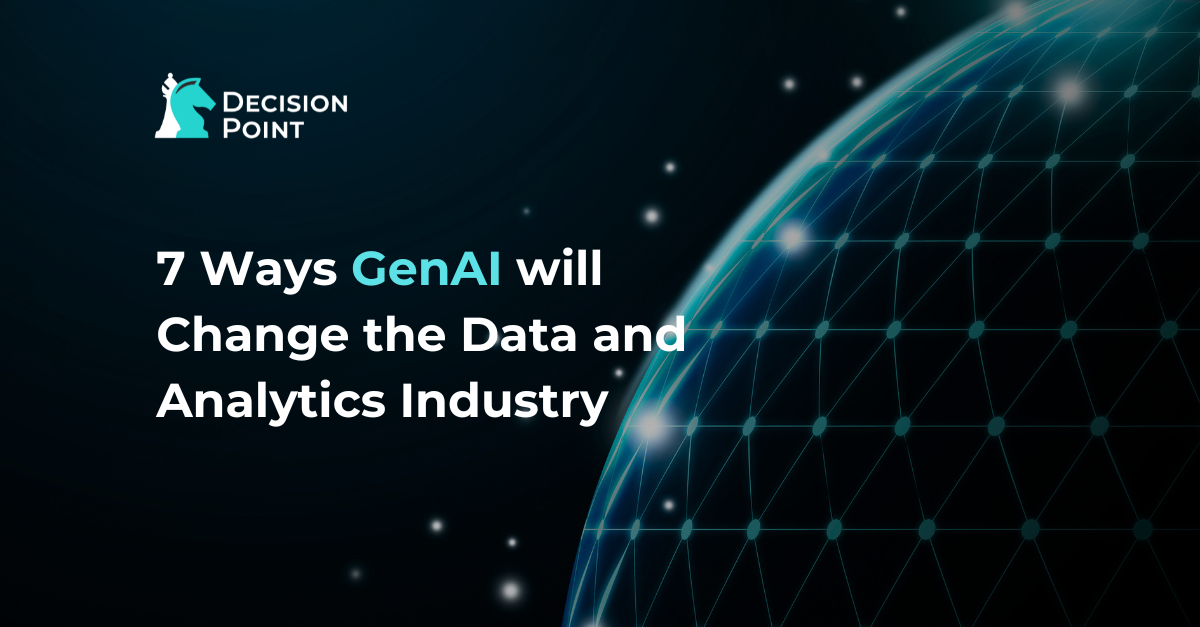There’s no doubt GenAI is ruling the AI world and transforming the data and analytics industry. And executives may have plenty of questions – Will it disrupt my business? What are the new challenges and how do I manage them? Where do I start?
Well, these can be the valid questions that can hamper business growth and distract you from real opportunities. So, a better start can be – How can GenAI accelerate better outcomes and better position us to lead in a dynamic industry landscape?
In today’s data-driven world, the ability to harness and interpret vast amounts of information is crucial for businesses across all industries. With the rapid advancement of AI, a new era has emerged that gives non-techies a powerful way to speed up tasks and unparalleled opportunities for data and analytics.
In this blog, we will explore the transformative ways in which GenAI is set to revolutionize the data and analytics landscape.
1. Supercharged Data Processing
GenAI leverages genetic algorithms and machine learning techniques to enhance data processing capabilities. By mimicking the process of natural selection, GenAI can efficiently analyze vast datasets and optimize complex algorithms. For instance, in healthcare, generative AI can create synthetic patient data to develop and test new medical algorithms without compromising patient privacy.
2. Intelligent Data Cleansing
Data quality is a paramount concern in analytics, as inaccurate or incomplete data can lead to flawed insights. GenAI offers a unique advantage by applying genetic algorithms to automate data cleansing. It can identify patterns, detect outliers, and impute missing values, resulting in cleaner datasets. This streamlined process enables businesses to make informed decisions based on accurate information.
3. Enhanced Predictive Analytics
Predictive analytics enables businesses to forecast future trends and make proactive decisions. GenAI amplifies this capability by integrating genetic algorithms with machine learning algorithms. It can optimize models, fine-tune parameters, and improve accuracy, ultimately driving more accurate predictions. For instance, in finance, GenAI can analyze historical market data, genetic patterns, and external factors to provide more reliable investment recommendations.
4. Personalized Customer Insights
GenAI has the potential to transform customer analytics by unlocking personalized insights at scale. By combining genetic algorithms with customer data, GenAI can identify patterns and preferences unique to individuals. For example, in e-commerce, GenAI can analyze purchase histories, browsing behavior, and demographic data to offer tailored recommendations, improving customer satisfaction and retention.
5. Optimal Resource Allocation
The efficient allocation of resources is a critical factor in business success. GenAI can optimize resource allocation processes by leveraging genetic algorithms to identify the most effective strategies. This can be applied to various domains, such as supply chain management, workforce scheduling, and energy distribution. By finding the best possible configurations, GenAI helps organizations maximize efficiency and reduce costs.
6. Smart Decision Support
GenAI can serve as a valuable decision-support tool by providing intelligent insights and recommendations. By analyzing vast amounts of data, GenAI can identify correlations, uncover hidden patterns, and offer data-driven suggestions. For instance, in healthcare, GenAI can analyze patient records, medical literature, and genetic data to assist doctors in diagnosing diseases and prescribing personalized treatments.
7. Democratization of Data Insights
One of the most significant impacts of GenAI in the data and analytics industry is the democratization of data insights. GPT-powered systems can provide intuitive and user-friendly interfaces, enabling non-technical users to interact with complex data and obtain valuable insights. Natural language interfaces can allow business users to ask questions and receive data-driven answers, eliminating the need for specialized technical skills. This democratization empowers a wider range of individuals within an organization to make informed decisions based on data-driven insights.
Having said that, GenAI represents a paradigm shift in the data and analytics industry. Its ability to supercharge data processing, automate data cleansing, enhance predictive analytics, provide personalized customer insights, optimize resource allocation, and offer smart decision support is poised to revolutionize the way businesses operate and make decisions. Furthermore, the democratization of data insights through GenAI empowers organizations to unlock the full potential of their data, regardless of technical expertise. As GenAI continues to evolve and mature, it will undoubtedly drive innovation, efficiency, and competitive advantage in the data-driven world, transforming industries and shaping the future of data and analytics.

